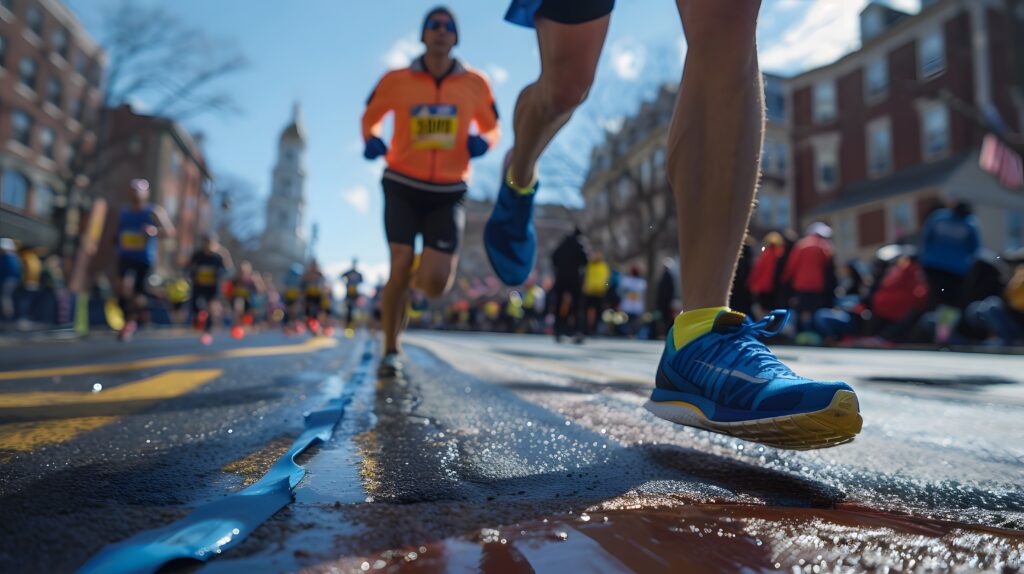Boston Marathon Tightening Time Standards for Downhill Courses

The Boston Athletic Association, the organizers of the famed Boston Marathon, have announced that qualifying times submitted on certain downhill courses will face a time adjustment to account for the assist that gravity provided.
Beginning with the 2027 registration cycle, runs submitted from events with more than 6,000 feet of net downhill are no longer eligible for the time standard. Runs submitted from events with more than 3,000 feet of net downhill will feature a ten minute time adjustment. Runs on courses featuring between 1,500 feet and 2,999 feet will have five minutes added to their times.
This impacts events like the gaining in popularity REVEL brand series of events, who specialize in net downhill races. Their signature tagline on their website: “We do BQs.” Now, runners at their events will have to chase even faster than ever, as most of their races will be subject to the full ten minute time penalty.
Course shopping will still remain a popular activity. Some of the most popular fall races, including the California International Marathon, still feature a net downhill course and large groups with the same qualifying target in mind.
These changes come as the B.A.A. also further reduced qualification times in the most recent qualifying cycle, following the 2025 year where more than 12,000 applications were rejected. Runners had to run nearly seven minutes below their published qualifying standard in order to make this year’s race.
The revised 2026 qualifying time standards are below.
| Age Group | MEN | WOMEN | NON-BINARY |
|---|---|---|---|
| 18-34 | 2hrs 55min | 3hrs 25min | 3hrs 25min |
| 35-39 | 3hrs 00min | 3hrs 30min | 3hrs 30min |
| 40-44 | 3hrs 05min | 3hrs 35min | 3hrs 35min |
| 45-49 | 3hrs 15min | 3hrs 45min | 3hrs 45min |
| 50-54 | 3hrs 20min | 3hrs 50min | 3hrs 50min |
| 55-59 | 3hrs 30min | 4hrs 00min | 4hrs 00min |
| 60-64 | 3hrs 50min | 4hrs 20min | 4hrs 20min |
| 65-69 | 4hrs 05min | 4hrs 35min | 4hrs 35min |
| 70-74 | 4hrs 20min | 4hrs 50min | 4hrs 50min |
| 75-79 | 4hrs 35min | 5hrs 05min | 5hrs 05min |
| 80 and over | 4hrs 50min | 5hrs 20min | 5hrs 20min |
Continue the discussion at forum.slowtwitch.com
15 more replies







I’m surprised they’re starting with 1500ft as the first cutoff. I’d have figured that they would have gone with 500 (Boston is 400 something).
The net downhill course in my area - the Petit Train Du Nord - is a gentle 1% net downhill for 722ft. I’m surprised that any rule that penalises downhill courses wouldn’t include this one.
But yes, this is a good idea
I have run a mix of down hill, flat, and hilly marathons. My fastest Marathons have been on flat courses. My last down hill marathon was in 2019. I was thinking of scheduling another down hill marathon to see if it would make my times any faster. It looks like I can plan on a 5 minute boost. I think most are going to recognize that they are better off running flat courses at sea level than going to regions that have enough elevation to do a down hill course.
Note: I will be doing my first down hill half marathon next month. I went through all the grade adjusted pace cautions and the math suggested that I would be about 2-3 minutes faster than my last half marathon that was flat and at sea level (although the first few miles are on gravel so it will probably be a lot less than that). I then went through the altitude adjustments calculations and the math suggested that I would be 2-3 minutes slower. So I am going to call it wash but expect to be slower than my last half marathons since 1) this is a small race and my last one had an local elite field 2) the start is over 8,000 feet above sea level and even with the altitude adjustments I don’t know if I will be able to match what I can do at sea level 3) the first could of miles are gravel and that is going to factor in too. Still I am curious to see how this net elevation drop will impact my time. I am guessing it would help much if any but if I PR, I will defiantly be happy.
There are a dozen ways to game these marathon qualifications. There are whole websites dedicated to improving your chances of getting a BQ time. There are even more ways to game a Triathlon score though.
When I was part of an NCAA track program there were altitude adjustments for qualifying for the national meet. My university was at 7,200 feet above sea level and my coach had a post-graduate degree in altitude training. The coach knew that the altitude adjustments done by the NCAA only made up for about half of the actual difference in performances at altitude so he always made sure to take the team to a sea level meet at the peak of the season to give everyone a fair chance at qualifying for the NCAA national meet. Again…there are a dozen ways to game the system. I am okay with a little flexibility on the difficulty of race courses without adjustments. I always thought it was odd that a course could be used as a BQ course though if it couldn’t be used to set a National Record/World Record though.
That’s true. A gentle 1% downslope course will be hella fast. But it’s better than spending a decade pretending that Revel races do not exist.
This makes sense with the number of qualifying times that are getting submitted.
What it also does is make those 1400 and 1500ft courses super in demand.
You be quiet!!! lol. I’m registered to do the Petit Train marathon for the first time this year…
Good luck! I set a PB last year which I 80% attribute to the net downhill of the course. Though outside of that, it’s a really nice course and well run.
Interesting! Our local “downhill” marathon, Mountain to Beach Marathon in Ventura County, CA drops only about 700 feet, and yet I was able to run it 9:30 faster than California International Marathon, which has a reputation as somewhat downhill but is only a couple hundred feet of elevation drop.
Whereas, Revel Canyon City, before it was “retired” (likely to let everybody heal up their shredded quads and splintered shins) dropped more than 5,000 feet on Highway 39 outside Los Angeles. That’s a route that is more popular with bicycle climbers to get up into the local mountains. Must have been lots and lots of qualifiers on that course.
Originally published at: Boston Marathon Tightening Time Standards for Downhill Courses - Slowtwitch News

The Boston Athletic Association, the organizers of the famed Boston Marathon, have announced that qualifying times submitted on certain downhill courses will face a time adjustment to account for the assist that gravity provided.
Beginning with the 2027 registration cycle, runs submitted from events with more than 6,000 feet of net downhill are no longer eligible for the time standard. Runs submitted from events with more than 3,000 feet of net downhill will feature a ten minute time adjustment. Runs on courses featuring between 1,500 feet and 2,999 feet will have five minutes added to their times.
This impacts events like the gaining in popularity REVEL brand series of events, who specialize in net downhill races. Their signature tagline on their website: “We do BQs.” Now, runners at their events will have to chase even faster than ever, as most of their races will be subject to the full ten minute time penalty.
Course shopping will still remain a popular activity. Some of the most popular fall races, including the California International Marathon, still feature a net downhill course and large groups with the same qualifying target in mind.
These changes come as the B.A.A. also further reduced qualification times in the most recent qualifying cycle, following the 2025 year where more than 12,000 applications were rejected. Runners had to run nearly seven minutes below their published qualifying standard in order to make this year’s race.
The revised 2026 qualifying time standards are below.
I’m sure this has been said before, but these blanket time standards disproportionately impact the faster groups.
A 44M (3:05) has to run 40 minutes faster than a 45F (3:45). You can subtract 7 min from those numbers straight away, now on a maximal downhill course another 10 min. 45F has to go 7.5% faster and 44M has to go 9.2% faster, 22% greater increase.
I don’t have a horse in the race or a better solution.
Great news! Thanks for posting. I’d even written them about this. Thought the Revel races should not be qualifiers at all.
The Boston field is a zero sum game. If someone qualifies because they ran a big downhill race, they are taking a someone else’s spot.
It’s weak and devalues the accomplishment.
Just get rid of the big downhill races as qualifiers.
This is dumb rule…
Not really… The game is the game… I dont think you can really say that they are “Stealing” someones spot…
If there are 30,000 spots available and someone qualifies 0m:01s faster than you, and you’re on the bubble, then they get that spot that you were going to get. Fair play if the courses are the same, but if you’re using a course to get an advantage, then yes, they got that spot as a result of the course and as a result of the course, are taking the spot away from someone who did it on a different course.
It may be the game (or was the game), but most everyone can agree (and now BAA) that it gives an unfair advantage outside of what is reasonable in the sport
Thx! I’ve been to the Tremblant WTC races, both half and full, almost every year since 2012, goes without saying we like it there.
My BQ standard is 3:20, so realistically need sub 3:15. My PB from a few years ago is about 3:17 on a flat course, interested to see what I can do here.